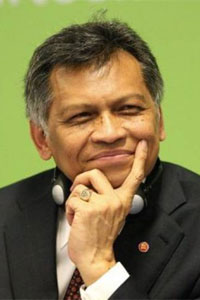I recently had the opportunity to speak about Thailand's sufficiency economy philosophy, a development model conceived by His Majesty King Bhumibol Adulyadej, to the UN Conference on Trade and Development (Unctad), in Geneva, and the UN Educational, Scientific and Cultural Organisation (Unesco) in Paris.
It is a development model suitable for communities and states worldwide — particularly those looking for an alternative route to development. The method makes sustainable development achievable in today's globalised world.
The Unctad Geneva event, organised by the Permanent Mission of Thailand, Geneva and the Thailand Sustainable Development Foundation (TSDF); and the Unesco Paris talk, by the Royal Thai embassy in Paris and TSDF, showcased success stories of the sufficiency economy philosophy at schools throughout Thailand at an exhibition entitled "Cultivating a Sufficiency Mindset in Schools".
In Thailand we are following the philosophy, which teaches rural farmers to be self-sufficient, in a conscientious way.
We have discovered that if we help local communities and villages to learn more about the approach, we assist them to get out of debt, produce more crops and efficiently manage their own affairs to eventually create surpluses to share, sell and trade with neighbouring communities and, of course, export.
At the local level, a sufficiency economy starts with self-productivity and self-help, but it also crosses over into the moral and ethical spheres of a community and results in the reduction of conflict and unemployment.
Businesses and organisations should explore the sufficiency economy philosophy as a means of collective survival.
It is a way to run the world through shared resources and the equitable distribution of the fruits of development.
But individual self-sufficiency is just the first step. It does not stop there. Contrary to what some may believe, the philosophy is not anti-trade, anti-growth, nor anti-globalisation - it actually prepares our people to participate in globalisation.
Today I am pleased to say the sufficiency economy philosophy is also being integrated into the Thai school curriculum.
Our enlightened monarch articulated the philosophy based on the experiences of Thai people, and how they face, manage and survive daily problems.
Every country has a specific role towards the achievement of peace.
Through education, culture and science, each state can contribute to sustainable development.
Bringing together all of these different ideas and initiatives from around the world will benefit all of mankind.
Currently 14,000 schools in Thailand are experimenting with the sufficiency economy approach. Students learn to grow their own vegetables and fruits, and to raise their own chickens and pigs. What we have found is that the students take the lessons that they learn back home to their parents.
It has a beneficial impact on families, who learn to live in a more responsible and sustainable way. Big businesses are supporting these projects because they know it is a proven way to eradicate poverty, conserve the environment, get out of debt and prevent conflicts.
It is my greatest aspiration that we can all work together for the sufficiency economy philosophy to ensure sustainable growth and the evolution of humanity.
Surin Pitsuwan is president of the Future Innovative Thailand Institute (Fit), a former Asean secretary-general, and a former foreign minister of Thailand.
